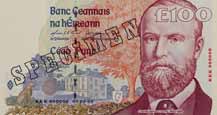
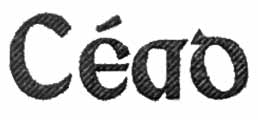
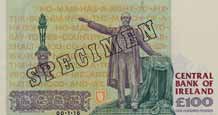
The Central Bank of Ireland Archive was opened to public access in 2017. It has provided previously unknown information on the designs of the Series C banknotes. Some content in this article draws on information from the archive. This is referenced as CBIAR in the text.
The Parnell Irish 100 pound note was designed by Robert Ballagh.
The final denomination of the Central Bank of Ireland Series C Legal Tender Notes to be issued features Charles Stewart Parnell, an important nineteeth century Irish politician.
The Parnell £100 note entered circulation on 13 September 1996 [CBIAR].
The theme of Ireland's Series C banknotes centres around important Irish historical people of the 19th and early 20th centuries in Ireland, the era of the formation of modern Ireland.
On the face, is the text in Irish 'Banc Ceannais na h-Éireann' (Central Bank of Ireland) 'Céad Punt' (One Hundred Pounds). Below the signatures are the titles of the signatories in Irish: 'An Gobharnóir' (Governor) and 'Rúnaí na Roinne Airgeadais' (secretary of the department of finance).
On the reverse, is the text 'Central Bank of Ireland', £100 'Legal Tender' in the blank field below the watermark.
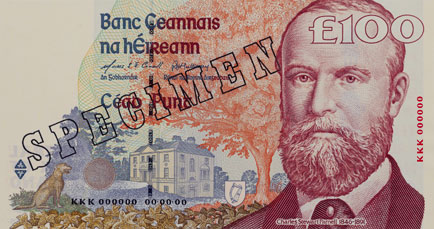
![]()
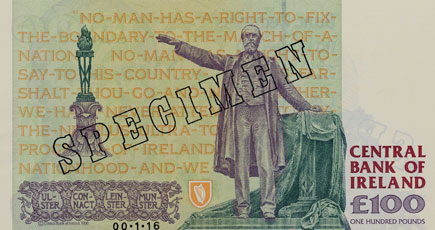
On the right is a large portrait of Charles Stewart Parnell (1846-1891) [2.], Irish nationalist politician, MP (1875-1891), and Leader of the Irish Parliamentary Party from 1882 until 1891. He was a strong proponent of home rule for Ireland.
A view of Avondale House and gardens in Co. Wicklow [3.], the home of Parnell, is in the background, with an Irish wolfhound on the lower left.
A circular latent image is printed in gold on the lower left. When tilted to the light it reveals the letters 'IR'. This is surrounded with the words 'BANCCEANNAISNAHEIREANN' repeated in microprinting
The reverse of the new Irish 100 pound note features several elements of the Parnell monument [4.] completed in 1911 in O'Connell St., Dublin: the statue of Parnell, the torch from the top of the monument and the metalwork with the names of the four provinces of Ireland.
In the background of the note is a declaration, which also appears on the monument, made in 1886 by Parnell in response to the introduction of the Home Rule Bill [5.], which would partially reverse the Act of Union (1801), the Act which had abolished the Irish Parliament.
Although the largest banknote of the Series C, The Charles Stewart Parnell £100 note is considerably smaller than the Series A Lady Lavery £100 note which it replaced in circulation.
The Series A Lady Lavery £100 note which had been first issued in 1928 had remained in circulation throughout the lifetime of the Series B banknotes due to the cancellation of the development of the Series B £100 note. The issue of the Series B £100 note had been cancelled due largely to the Central Bank's determination that the denomination was not needed, and to the intention of developing a new reduced size series of banknotes [CBIAR].
The dimensions of Irish Series C pound notes occasionally varied very slightly by up to a millimetre. Generally, this variance has most often been noted on some replacement notes. The dimensions below for the Parnell 100 pound note are from measurements of actual notes.
Series A, Lady Lavery 100 Pound Note, 203 x 114 mm.
Series C, Charles Stewart Parnell 100 Pound Note, 152 x 80 mm.
Below are illustrated the final date of Series A £100 notes, and the first date of Series C £100 notes.
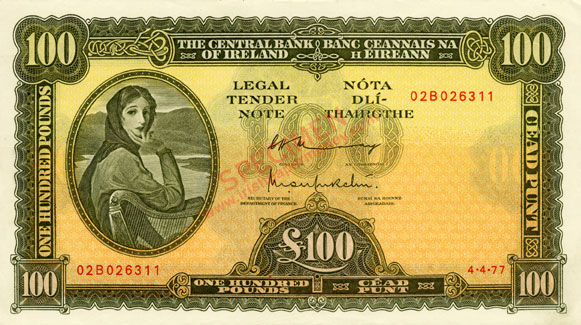
![]()
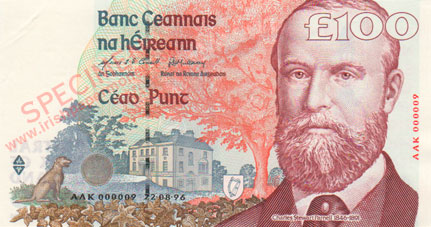
The Series C Irish banknotes are often termed the 'Irish Punt series', probably due to their being printed exclusively in Irish on the face side. The Charles Stewart Parnell '100 Punt' was the least common denomination of the series, and was not seen in general circulation.
There is no record of Parnell 100 Pound notes ever having been issued through ATMs, the £50 note being the highest denomination distributed in this fashion.
Face, primarily red and orange with multicoloured underprint.
Serial numbers are printed in red and black ink. All notes bear a date of issue in black ink.
Reverse colouring is mainly green, grey and yellow.
Metallic Thread: A stardust metallic security thread, one which breaks the surface of the paper at regular intervals, is embedded in the paper slightly to the right of center when the note is viewed from the face side. The metal thread incorporates the denomination in figures, £100, repeated along its length. Stardust security threads were a standard security feature used in banknote manufacture of the time.
Microprinting on either side of the base of the torch on the reverse of the Parnell 100 note, which repeats the lettering 'Central Bank of Ireland One Hundred Pounds' in uppercase type: 'CENTRALBANKOFIRELANDONEHUNDREDPOUNDS'
Watermark: A watermark featuring the portrait of Lady Hazel Lavery and incorporating the denomination in numerals is used on the Parnell £100 note.
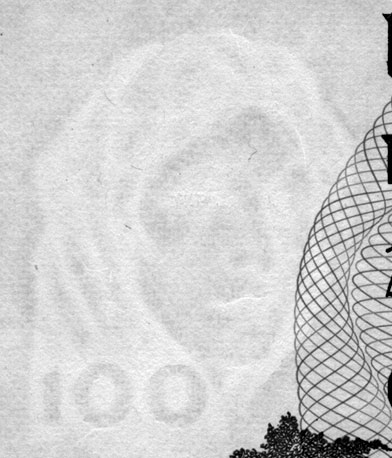
The watermark of Lady Lavery which appears in the top right field of the Parnell 100 pound note
Certain areas of the face and reverse of the Series C Parnell £100 note fluoresce under UV light.
Fluorescent fibres are contained within the body of the note, as well as the image of a harp on the pedestal of the statue on the reverse of the note which can be seen under when it is viewed under a UV light source.
The Parnell 100 Pound note was the last denomination of Series C to enter circulation, in 1996.
The note circulated for just six years until it was replaced by the introduction of the Euro notes in Ireland in 2002.
E163, Type 21. Signatures: Muiris S. Ó Conaill. P. Mullarkey. 1 Date, 22.08.96, 1 base letter.

The Series C Irish 100 Pound Charles Stewart Parnell note
There was only one date of issue for the Series C £100 note, 22.08.96. The date was not printed with a complete prefix range.
The following prefixes have been recorded for the £100 Parnell note: AAK, BAK, FAK, indicating an actual issue of up to 3 million notes.
The Charles Stewart Parnell hundred pound notes are common, and easy to obtain. The notes carry a significant premium in grades of VF or better, selling for well above their face value.
Although many notes were kept, Parnell 100 notes are quite scarce in true UNC grade 67 or higher, with four sharp corners and no handling. Must notes in UNC region would grade 66 or lower due to minor handling and other slight defects. This is likely because the notes were difficult to obtain withour their having been handled by bank staff as they were not generally issued. At least one instance of a group of notes taken from a block is known, these notes regularly grade 67 or higher.
Parnell 100 replacement notes were printed with KKK prefix. Replacement notes in the range 000005 to low 004000s have been recorded, as well as numbers higher than KKK 010000.
Replacement notes are rarely offered for sale. Generally £100 KKK replacement notes are found in either AU 55 grade or in UNC 67 grade. A few well circulated replacement notes have also been recorded.
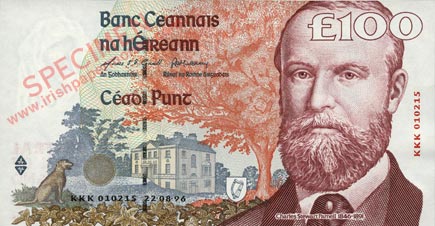
The Irish Replacement Notes List is continually updated with information on new sightings of replacement notes.
References [Last retrieved 04.08.24]
1. Central Bank of Ireland Archives, Dublin. Referred to as CBIAR in the text. [Accessed 24 May 2018].
2. Charles Stewart Parnell (1846-1891) <https://www.dib.ie/index.php/biography/parnell-charles-stewart-a7199>
3. Avondale House and gardens, Co. Wicklow, Ireland. <https://www.beyondthetreesavondale.com/avondale-house/>
4. Parnell monument, Dublin. <https://www.buildingsofireland.ie/buildings-search/building/50010557/charles-stewart-parnell-monument-oconnell-street-upper-parnell-street-dublin-dublin>
5. Home Rule Bill 1886 <https://www.parliament.uk/about/living-heritage/evolutionofparliament/legislativescrutiny/parliamentandireland/overview/two-home-rule-bills/>
1 Pound Ploughman
5 Pounds Ploughman
10 Pounds Ploughman
20 Pounds Ploughman
50 Pounds Ploughman
100 Pounds Ploughman
Irish Ten Shilling Notes
1 Pound Note Lady Lavery
5 Pounds Lady Lavery
10 Pounds Lady Lavery
20 Pounds Lady Lavery
50 Pounds Lady Lavery
100 Pounds Lady Lavery
1 Pound Note, Queen Medb
5 Pound Note, John Scotus Eriugena
10 Pound Note, Jonathan Swift
20 Pound Note, W. B. Yeats
50 Pound Note, Turlough O'Carolan
100 Pound Note, Grace O'Malley
5 Pound Note, Sister Catherine McAuley
10 Pound Note, James Joyce
20 Pound Note, Daniel O'Connell
50 Pound Note, Douglas Hyde
100 Pound Note, Charles Stewart Parnell
Northen Ireland Polymer notes
Bank of Ireland Polymer Notes
Danske Bank Polymer Notes
Ulster Bank Polymer Notes
Special Sections and Articles
The Transition of Irish Currency, Irish banknotes 1918–1928
The Partition of Irish Currency, Irish banknotes 1928–1930
Banknote Design Evolution 1824 to 1916
Irish Three Pound Notes
Contemporary Forgeries of Early Irish Banknotes, ca1800-1930
Limerick Soviet Notes
Irish World War 2 Banknote Issues
Low Number Irish Banknotes
Irish Joint Stock Banks of Note Issue from 1783
Irish Legal Tender Note Specimens
Ploughman Scan Survey (PSS)
![]() Stable version. Last update 04.08.24.
Stable version. Last update 04.08.24.